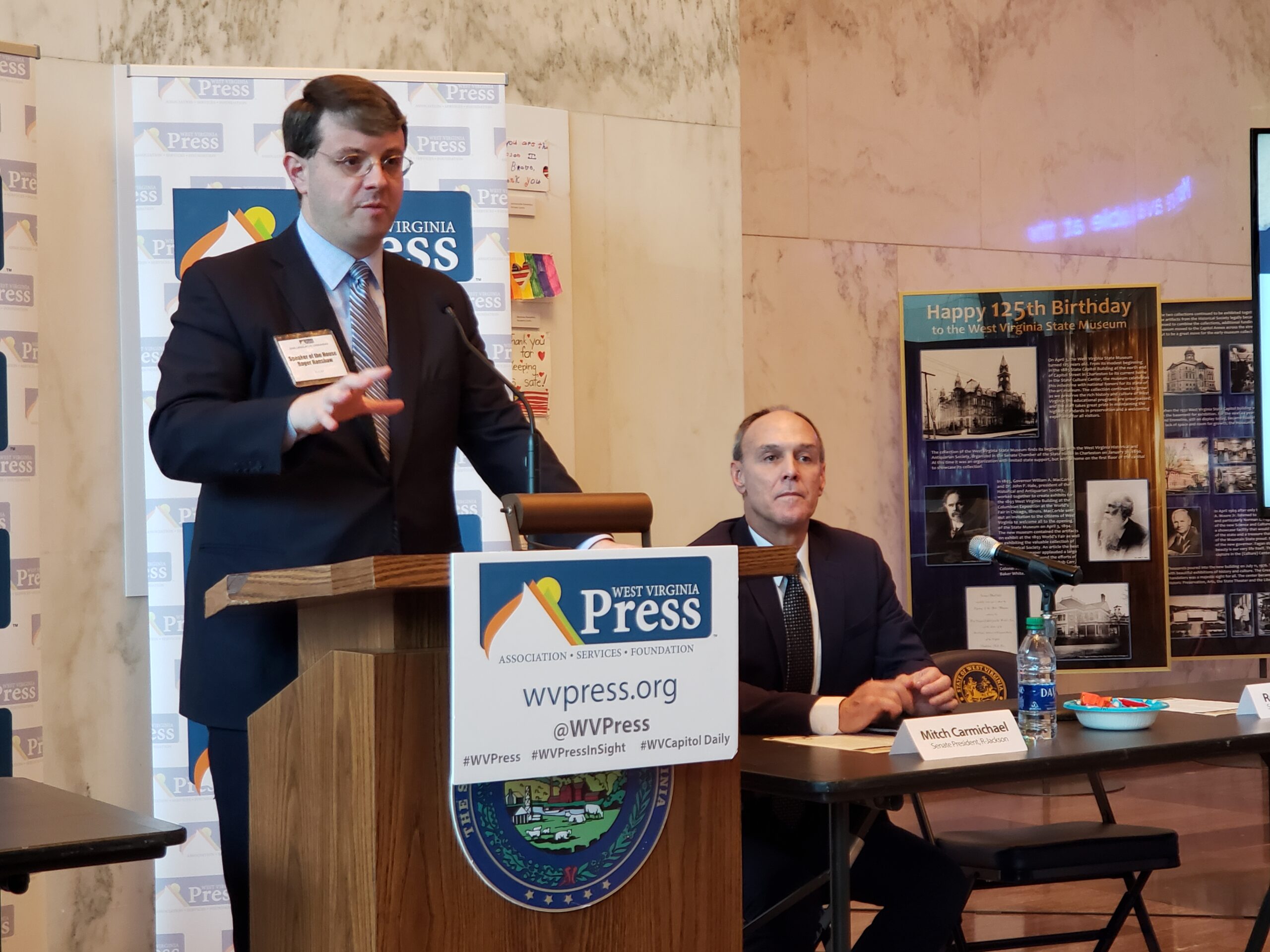CHARLESTON – West Virginia’s top two legislative leaders have their eyes on an array of bills for improving the state during the 2020 session, which begins Wednesday.
Among them, ending the tax on business equipment, inventory and machinery; create a state-backed investment fund to draw outside dollars; and getting people back to work.
Senate President Mitch Carmichael and House Speaker Roger Hanshaw shared their priorities with media representatives Friday during the West Virginia Press Association Legislative Lookahead at the Capitol campus.
Reflecting on the inventory tax, Carmichael said, “This is the number one job killing tax in the state.” It’s been talked about for more than three decades, and highlighted as an obstacle in three governors’ reports. “We want to be the legislature that gets rid of it.”
The problem is, the tax funds schools and counties. Figuring out how to replace it has been a sticking point. Carmichael said he sees making it up through natural economic growth. He spelled that out more during an interview after the session.
The tax cut would eliminate about $100 million in revenue, he said. The current budget contains more than $200 million allocated for one-time spending. So the budget could easily handle $25 million in each of the next four years to phase out the tax, barring an enormous drop in revenue projections.
Economic growth fluctuates but averages 6% to 7% annually across the years, he said. “The changes we’re making now, the incline we’ve been on, have been really substantial. I really don’t expect any problem eliminating that over a four-year period. But, politically, sometimes it gets tough.”
Hanshaw has been touting his bill to create the Mountaineer Impact Fund, which will use state investment dollars to sponsor and draw investment capital from other entities and capital outside the state’s borders, he said.
With the fund, West Virginia would partner with the large investors who are interested in putting money into the state’s vast shale resources. The Mountaineer Impact Fund would be a form of sovereign wealth fund that would allow the investors to feel safe with their investments.
The GOP will make another go at creating an intermediate court of appeals, Carmichael said. This court is a checkmark for big entities scouting for new homes and looking for an absolute right to appeal and a fair hearing.
As far as getting people back into the workforce, Carmichael said last year’s SB 1, the last-dollar-in community college and vocational training bill, has been a success. Since June, the state has received 2,367 applications for West Virginia Invests, the program that supplies the grant money. From those applications, 1,000 people got state money while 1,345 received federal funds for their training.
Hanshaw said that the next step is getting people access to the training. It’s not always easy for people to pack up and move to where the classes are offered. So they’re eyeing the possibility of allowing four-year schools to offer trade-based programs.
That idea didn’t sit well last session with the two-year schools leery of competition.
Hanshaw also wants to look at occupational licensing, he said. West Virginia is the 44th most regulated environment in the U.S. for occupations. “We think it’s time to evaluate whether that’s still appropriate.”
He doesn’t mean ending licenses for physicians or other healthcare workers, but for upholsterers and such who don’t really need licensing. They’ll also review licensing for people who’ve already received military training in the field or are licensed in other states – what he called expanded reciprocity.
People need to drive to work in West Virginia, Hanshaw said, but more than 60,000 lack driver’s licenses. They want to examine the judicial and administrative problems that allow people ot lose their licenses based merely on charges, without convictions.
Regional jail bills are crippling counties, Hanshaw said, but more than 50% of people in jails haven’t been convicted; they’re awaiting trial. So they want to look at new ways to use the state’s bail and bond statues to ease that burden. And they want to look at criminal code, particularly drug statutes.
The two leaders fielded a question about proposed nondiscrimination legislation for the LGBTQ community. Carmichael has taken flak for appearing to support such a bill, then backing off.
Carmichael clarified that he hasn’t endorsed such legislation. But he wants to hear both sides.
Hanshaw said current law contains nine protected classes and he wants to be careful about creating another. “I am generally hesitant on any bill that creates more protected classes.”
But, when asked, they both said members of the LGBTQ community should not be denied work or housing based on their status. Hanshaw stated more generally that no one should be denied those things.
TWEET @dbeardtdp




